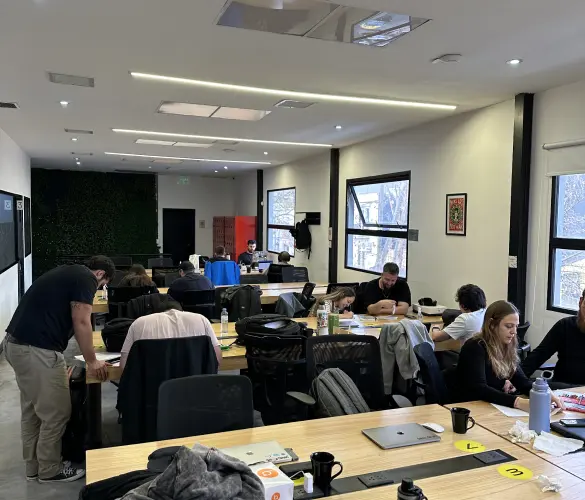A website is never truly complete. Even websites built on WordPress, the world’s most popular content management system (CMS), need regular maintenance to perform at their best, keep up with evolving best practices, and protect their data from bad actors like hackers. However, the cost to maintain a WordPress website varies significantly depending on its scale and complexity.
That’s why website owners must consider long-term, ongoing maintenance costs in addition to development costs. After the website is ready, you still need to incur upkeep expenses, which depend on multiple factors.
This article explores the average cost of maintaining a WordPress website, the factors influencing the cost, and the benefits of regular website maintenance.
The average cost to maintain a WordPress website

Because every website is different and tailored-made for the owner’s or brand’s needs, there’s no strict rule for how much it costs to maintain them. Factors such as domain name registration and renovation, web hosting, size, and complexity influence maintenance costs.
That said, the lowest you should reasonably expect to spend on yearly maintenance is $75 to $100 for DIY maintenance of very basic websites with no significant expenses on plugins, themes, security measures, professional web developers, etc. Without these additional expenses, the primary maintenance costs are domain name registration/renovation and your web hosting plan.
But as websites get more complex, employees come in, and maintenance needs increase, so do costs. Personal blogs and websites may cost $5 to $75 per month. On the other hand, small business websites may cost from $30 to $400 – $600 per month.
As we move into the medium and large businesses like complex corporate sites and ecommerce marketplaces that require significant talent to keep running, we enter the $200 to $700 per month zone. These sites could cost $4,000 – $5,000 per month or even more if they belong to massive companies making millions per year.
In short, the cost to maintain a WordPress website can be as little as $5 per month and as much as dozens of thousands, depending on its size, complexity, and the talent needed to keep it running.
Note: Keep in mind that in this article, we’re talking about WordPress.org, the original, open-source, and self-hosted WordPress alternative. For estimates on the costs of maintaining a site using WordPress.org’s managed hosting fork, WordPress.com, check out out comparison.
Factors that influence the cost to maintain a WordPress website
Hourly rates
The primary cost associated with WordPress site maintenance is how much it costs to hire developers to build and maintain it. WordPress developers cost $20 to $150 per hour, depending on whether they’re freelancers or part of an agency. Since agencies have higher upkeep costs and entire teams at their disposal to engage in complex projects freelancers couldn’t do on their own, they command more pay.
The monthly maintenance cost depends on the hours necessary to perform maintenance duties. It may range from $200 – $500 to several thousand dollars on large and complex websites. Some developers and agencies also charge based on a monthly retainer, ranging from a handful of monthly hours to over 40.
Maintenance duties tend to take 2 to 5 monthly hours for updates and security scans but may take more for more complex needs.
Size and complexity
The larger and more complex a website is, the more moving parts it has and the more experienced developers should be to maintain it.
For example, a large ecommerce website that receives thousands of unique visitors a month requires specific knowledge of ecommerce development for WordPress. In contrast, a personal blog likely requires only essential updates and security scans. Freelancers and agencies may charge higher hourly rates when more specialized skills are needed.
Domain name
Domain names generally cost up to $100 for registration, but the average is around $15. For renovations, the cost may be as high as $130. On the lower end, some affordable alternatives cost as little as $12 per year.
Costs vary depending on the domain’s extension. The “.xyz” extension tends to be the cheapest, while the “.net” extension tends to be the most expensive.
Hosting plans
Hosting costs also vary depending on a few factors. The main factor is the hosting plan, which costs around $8 per month on average, sometimes billed annually. However, costs range from $2 to $80 per month, depending on the services the plan provides and its length.
However, managed WordPress hosting tends to be more expensive, as it provides premium services such as dedicated server hosting, daily automatic backups, and more advanced tech support. The more complete managed hosting plans can cost several thousand dollars per month, depending on the website’s needs.
Website traffic also influences hosting costs. In some cases, web hosts may charge you more the more traffic you receive. In others, you pay a flat monthly amount regardless of traffic and must upgrade your plan to increase performance for high-traffic sites.
Premium plugins and themes
While many free plugins and themes are available, some WordPress websites need premium services like advanced security measures or integration with social media to ensure safety and functionality. You may acquire premium plugins as a one-time payment, ranging from a few dollars to around $1,000.
Some premium plugins operate as a monthly subscription, ranging from $4 to around $50.
On the other hand, premium themes are always a one-time payment for a license (which you can share across multiple sites if you use WordPress multisite) that costs up to $200 but is generally around $60.
Tech support
If you hire a development agency to provide tech support for your employees or yourself, you’ll need to pay for that service, too. The cost may take the form of a monthly retainer and may ascend to several hundred or thousands of dollars, depending on what’s included.
SSL Certificate
Secure Sockets Layer (SSL) is a protocol that secures information exchanges over the internet by encrypting the contents of the messages. An SSL certificate is a digital file containing the information of an internet domain. The file is installed in the server containing the domain to secure traffic.
While some web hosts provide SSL certificates as part of their hosting plan, others require that you acquire them through third parties. SSL certificates for a single domain may cost a handful of dollars or several hundred.
Additional storage space
Some larger or growing websites may need to pay for additional server space. The cost varies depending on how much additional space websites need, reaching up to several hundred as a one-time payment or a monthly subscription.
Ecommerce-related costs
Ecommerce stores must consider costs like payment gateway fees, specialized hosting, inventory management, product photography and content creation, customer support, marketing, and analytics. The larger the marketplace, the more these costs add up.
Marketing
Brands looking to grow their online presence must engage in marketing campaigns and create valuable blog content. Depending on the scale of the campaigns, costs may be below $100 or go into the several hundred per month.
Common maintenance duties for WordPress sites

Developers perform multiple maintenance tasks to ensure their sites’ security and smooth functioning. Some of the most common tasks include the following.
- Core, theme, and plugin updates. Updates patch security vulnerabilities and ensure long-term functionality.
- Security scans. Security scans uncover vulnerabilities and breaches such as CSRF attacks and SQL injections.
- Spam management. Spam is a common issue for WordPress website owners. Developers manage spam by implementing comment moderation, managing file permissions, setting up CAPTCHA challenges, and more.
- Backups. Backing up sites allows web owners to roll back to a previous version if needed. It protects the site’s data when redesigning or updating.
- Performance improvements. Developers optimize page load times by implementing caching, compressing images, minifying CSS and JavaScript, and more.
- Database maintenance. Optimizing database queries is essential for database and site-wide efficiency.
- Finding and replacing broken links.
- Managing user accounts, roles, and permissions.
Benefits of regular WordPress website maintenance
Well-maintained websites enjoy multiple benefits, such as the following:
- Security. Updating themes, plugins, and core files ensures security and prompt patches, reducing the chance of breaches and malware infections.
- Search engine optimization (SEO). Mobile responsiveness, fast page loading, lack of duplicate content and broken links, security scans, and other maintenance tasks directly improve the website’s SEO.
- Better user experience. Well-maintained, high-performing websites provide better user experiences for visitors.
- Stability. Regular maintenance uncovers and solves potential issues that could lead to instability, crashes, and downtime.
- Cost savings. Fixing issues before they devolve into major site-wide problems is more affordable and less time-consuming than dealing with outages and usability problems.
- Data protection. Secure websites with multiple backups are protected from malware infections, hacking attempts, and other issues that compromise the integrity of their data.
Can you maintain your website on your own?

Maintaining your own basic, personal website costs only time, technically. As a result, if you can maintain your website as a personal passion project, by all means, do it. However, developing and maintenance needs will significantly increase if you plan to turn your website into a business.
At that point, hiring professional WordPress developers may be more time and cost-effective. Otherwisew, you’d have to manage every growing aspect of your site by yourself.
The cost to maintain a WordPress website varies based on many factors
Maintaining your WordPress website is a complex task. It involves multiple skills and consistency to keep up with current trends and best practices.
It can cost anywhere from under $100 per year for the most basic personal blogs to several dozens of thousands for large corporate sites or ecommerce marketplaces. The final cost depends on factors like domain name registration and renovation, web hosting plans, the developers’ hourly rates, the cost of premium plugins and themes, and more.
There’s also the option of doing it yourself. However, this option is better suited for small personal sites and small businesses. As your website becomes more complex, hiring professionals becomes a necessity.
To decide whether to do it yourself or hire developers, consider the scale of your website and the skills necessary to keep it running.
Related Articles

Business / 12 min read
Business / 12 min read
How to Take on More WordPress Development Projects While Maintaining Quality
As a digital agency that provides WordPress services, your job is to take on as many projects as possible while maintaining the highest quality. This is easier said than done…
Read More
Business / 9 min read
Business / 9 min read
How to Choose a WordPress Development Agency to Scale Your Projects?
When your agency starts to scale, you may decide that a big part of your expansion will be providing WordPress services. If that's the case but you don't have an…
Read More
Business / 7 min read
Business / 7 min read
How to Optimize Time and Resources in WordPress Projects
WordPress agencies need to optimize and human resources use in order for their services (development, QA, design, etc.) to be profitable. They need to plan these projects very thoroughly to…
Read More
Business / 11 min read
Business / 11 min read
How WordPress Outsourcing Can Help Scale Your Agency
WordPress development outsourcing is becoming more frequent and affordable every day, helping global digital agencies of all sizes scale their services without the long-term investment of hiring an in-house team.…
Read More
Business / 8 min read
Business / 8 min read
What Is a White Label WordPress Development Agency?
A white label WordPress development agency is a company of WordPress developers, QA analysts, and project managers who provide outsourced services to digital agencies that lack a development team. Importantly,…
Read More
